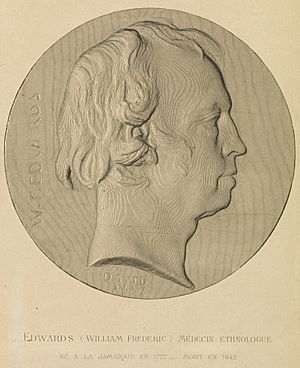William Frédéric Edwards facts for kids
William Frédéric Edwards (1777–1842) was a French scientist who studied how living things work. He was born in Jamaica and is sometimes called "the father of ethnology in France." Ethnology is the study of different human groups, their cultures, and their origins. Edwards is remembered for his idea that certain physical features in human groups stayed the same over many generations. He also helped start the study of "linguistics," which looks at languages, and suggested a new way to compare languages based on how words are pronounced.
Contents
Early Life and Education
William Frédéric Edwards was born in Jamaica in 1777. His parents were English. He went to school in England at New College, Hackney. One of his classmates there was the famous writer William Hazlitt. Edwards also studied in Bruges, a city in Belgium, where he first worked in the city library.
In 1808, he moved to Paris, France, to study medicine. He learned from a well-known scientist named François Magendie. Edwards wrote his medical paper on how the eye works and later became Magendie's helper.
Becoming a French Scientist
Edwards became a French citizen in 1828. The next year, in 1829, he was chosen to be a Fellow of the Royal Society in England, which is a very respected scientific group. He was also part of or helped many French scientific organizations. In 1832, he was elected to the Académie des sciences morales et politiques and the Académie Royale de Médécine, which are important French academies for science and medicine.
Scientific Discoveries
Edwards began his own scientific research around 1815. He worked on different chemical compounds and also investigated how animals could stop breathing, a condition called asphyxia.
Edwards was a scientist who believed in "vitalism." This idea suggested that living things have a special force that helps them live. He studied how physical forces, like temperature or pressure, affected processes in living organisms. His research led to his famous book, De l'influence des agens physiques sur la vie (1824). This book was later translated into English. Edwards continued the work of other scientists, like Antoine Lavoisier, who studied "animal chemistry," and he explored questions raised in his teacher Magendie's scientific journal. He did many experiments at the Collège de France.
Studying Human Groups
Edwards was very interested in understanding different human groups. He was influenced by another historian, Amédée Thierry, who studied the early people of France, like the Gauls and Franks. Edwards developed a theory called "permanence of types." This idea suggested that certain physical features of human groups stayed the same over a long time.
He became convinced of this idea in the early 1820s. During a visit to London, he talked with other scientists about ancient Egyptian mummies and tombs. They observed that the faces of ancient Egyptians looked similar to people living in Egypt at that time. This made Edwards believe that certain "types" of people could be seen throughout history.
Edwards's idea of "type" was flexible, but it became important in discussions about human groups in the 1800s. He built on earlier studies of physiognomy, which tried to understand character from facial features. Edwards was a pioneer in the idea that human groups could be identified by the shape of their face and head. He also studied Celtic languages to support his ideas.
Edwards's work helped establish the field of ethnologie (the study of human groups) in France. He influenced writers like Stendhal and Jules Michelet, who took ideas about the "persistence of races" from him. Edwards is considered one of the first scientists to discuss human groups in this way. He also used his ideas to support French nationalism, which is a strong feeling of pride and loyalty to one's country.
Edwards thought broadly about human diversity. He argued that human groups had fixed traits and characteristics. He disagreed with the idea that climate alone changed human populations after a single creation. He believed that climate did not have a strong influence on the bodies of animals in general. Even Charles Darwin, a famous scientist, mentioned Edwards's idea about how one type of animal might become dominant in mixed populations.
Founding the Société Ethnologique de Paris
Edwards continued his work on connecting physical features with human groups. In 1839, he founded the Société Ethnologique de Paris (Ethnological Society of Paris). This society had a wide program that included studying languages and traditions, not just physical traits. Its main goal was to define different human groups and find out where they came from.
Other similar societies were soon created in other countries. The Ethnological Society of New York and the Ethnological Society of London were founded a few years later. When Paul Broca started the Société d'Anthropologie de Paris (Anthropological Society of Paris) in 1859, he used the definition of ethnology that Edwards had created.
 | Aaron Henry |
 | T. R. M. Howard |
 | Jesse Jackson |


